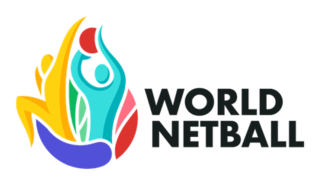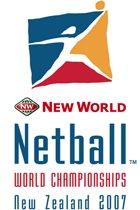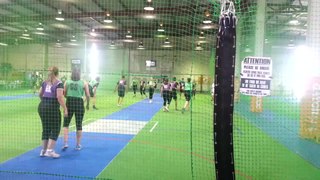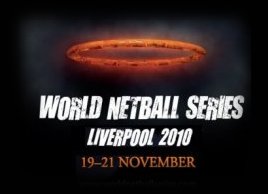
Netball is a ball sport played on a rectangular court by two teams of seven players. The primary objective is to shoot a ball through the defender's goal ring while preventing the opposing team from shooting through their own goal ring. It is one of a few sports created exclusively for women and girls and remains primarily played by them, on indoor and outdoor courts, especially in schools and most popularly in the Commonwealth of Nations.

World Netball, previously known as the International Netball Federation and the International Federation of Netball Associations, is the worldwide governing body for Netball. The INF was created in 1960 and is responsible for world rankings, maintaining the rules for netball and organising the Netball World Cup and Netball at the Commonwealth Games

The 2007 World Netball Championships was the 12th edition of the INF Netball World Cup, a quadrennial premier event in international netball co-ordinated by the International Federation of Netball Associations (IFNA). Sixteen nations contested the title from 10 to the 17 November. It was held in the West Auckland, New Zealand. Forty-eight matches over 8 days were played in The Trusts Stadium, Waitakere. The event was broadcast to over half a dozen countries

The 2011 World Netball Championships was the 13th edition of the INF Netball World Cup, a quadrennial premier event in international netball. It was held in Singapore from 3–10 July. All 48 matches were played at the Singapore Indoor Stadium. Singapore was chosen as the host nation at the 2007 IFNA Congress in Auckland.

Indoor netball is a variation of netball, played exclusively indoors, in which the playing court is surrounded on each side and overhead by a net. The net prevents the ball from leaving the court, reducing the number of playing stoppages. This gives indoor netball a faster pace than netball.

Netball is the most popular women's team participation sport in Australia. In 1985, there were 347,000 players, and in 1995, there were over 360,000 Australian netball players. Throughout most of Australia's netball history, the game has largely been a participation sport; it has not managed to become a large spectator sport. In 2005 and 2006, 56,100 Australians attended one to two netball matches, of these, 41,600 were women. 46,200 attended three to five netball matches, with 34,400 of those spectators being women. 86,400 attended six or more netball matches, with 54,800 spectators being female. Overall, 188,800 people attended netball matches, with 130,800 being female. In 2005 and 2006, netball was the 10th most popular spectator sport for women with Australian rules football (1,011,300), horse racing (912,200), rugby league (542,600), motor sports (462,100), rugby union (232,400), football (212,200), harness racing (190,500), cricket (183,200) and tennis (163,500) all being more popular. The country set an attendance record for a Netball match with a record crowd of 14,339 at the Australia–New Zealand Netball Test held at the Sydney Super Dome game in 2004.
Netball New Zealand is the national body which oversees, promotes and manages netball in New Zealand, including the Silver Ferns.
Laura Robyn Langman is a retired New Zealand international netball player, who last played domestic netball for the Sunshine Coast Lightning in the Australian Super Netball league. Primarily a midcourt player, Langman is a former captain and vice-captain of the New Zealand national netball team. She is the most capped player in the history of the Silver Ferns, having overtaken Irene van Dyk's record of 145 test matches in October 2018.

Netball is the most popular women's sport in New Zealand, in terms of player participation and public interest. With the national team, the Silver Ferns, currently ranked second in the world, netball maintains a high profile in New Zealand. As in other netball-playing countries, netball is considered primarily a women's sport; men's and mixed teams exist at different levels, but are ancillary to women's competition.

The history of netball can be traced to the early development of basketball. A year after basketball was invented in 1891, the sport was modified for women to accommodate social conventions regarding their participation in sport, giving rise to women's basketball. Variations of women's basketball arose across the United States and in England. At the Bergman Österberg physical training college in Dartford, England, the rules of women's basketball were modified over several years to form an entirely new sport: "net ball". The sport was invented to encourage young females to be physically active and energetic. The first codified rules of netball were published at the start of the twentieth century, and from there the new sport spread throughout the British Empire.

The 2009 World Netball Series was the inaugural tournament of the World Netball Series. The 2009 Series was held at MEN Arena in Manchester, England from 9–11 October, and was the first major trial of the new FastNet rules that were announced by the International Federation of Netball Associations (IFNA) in 2008. New Zealand won the 2009 tournament with a 32–27 victory over Jamaica in the gold medal playoff.
Fast5 is a variation of netball featuring shortened games and goals worth multiple points. The new format was announced by the International Federation of Netball Associations (IFNA) in 2008, and was primarily developed for a new international competition, the Fast5 Netball World Series. The rules were revamped for 2012, with the variation being renamed Fast5.

The 2010 World Netball Series was the second edition of the World Netball Series, an annual international netball competition held under fastnet rules. The 2010 event was held in Liverpool, England, and was contested between the top six national netball teams according to the IFNA World Rankings. After two days of round-robin matches, Jamaica and England finished on top of the standings. However, the 2010 tournament was won by New Zealand, who defeated Jamaica in the semi-final and England in the grand final.

Netball is a popular participant sport in some parts of the world, particularly in countries of the Commonwealth of Nations. According to the IFNA, over 20 million people play netball in more than 72 countries. IFNA member nations are divided into five regional groups: Africa, America, Asia, Europe and Oceania.
Kayla Malvina Johnson is a New Zealand netball player. As a high school student, Cullen played representative netball and basketball, and competed at a national level in athletics. In 2008, she was selected in the New Zealand U21 netball team, and was a member of the side that finished second at the 2009 World Youth Netball Championships, behind Australia.

The 2012 Fast5 Netball World Series was the fourth staging of the annual World Netball Series, and the first to be played under the new Fast5 rules, which replaced the older fastnet rules introduced in 2009. The tournament was held at Vector Arena in Auckland, the first time it had moved from its previous host nation England.
Bailey Mes is an Auckland born New Zealand netball player. She can play at goal shoot, goal attack, and wing attack. She currently plays for the Waikato/BOP Magic in the ANZ Premiership.

The 2013 Fast5 Netball World Series was the fifth staging of the annual Netball World Series, and the second to be played under the new Fast5 rules, which replaced the older fastnet rules introduced in 2009. The tournament was held at Vector Arena in Auckland for the second year in a row.
The 2017 Fast5 Netball World Series was the eighth staging of the annual Fast5 Netball World Series, and the fifth to be played under the new Fast5 rules, which replaced the older fastnet rules introduced in 2009. The tournament was held in Australia for the second time with the venue being at Hisense Arena in Melbourne.

The 2022 Fast5 Netball World Series was the tenth staging of the Fast5 Netball World Series, and the seventh to be played under the Fast5 rules, which replaced the older fastnet rules introduced in 2009. The tournament was held in New Zealand for the fourth time. The host city Christchurch was awarded hosting rights for the 2022 and 2023 tournaments, with matches played at the Christchurch Arena.


















